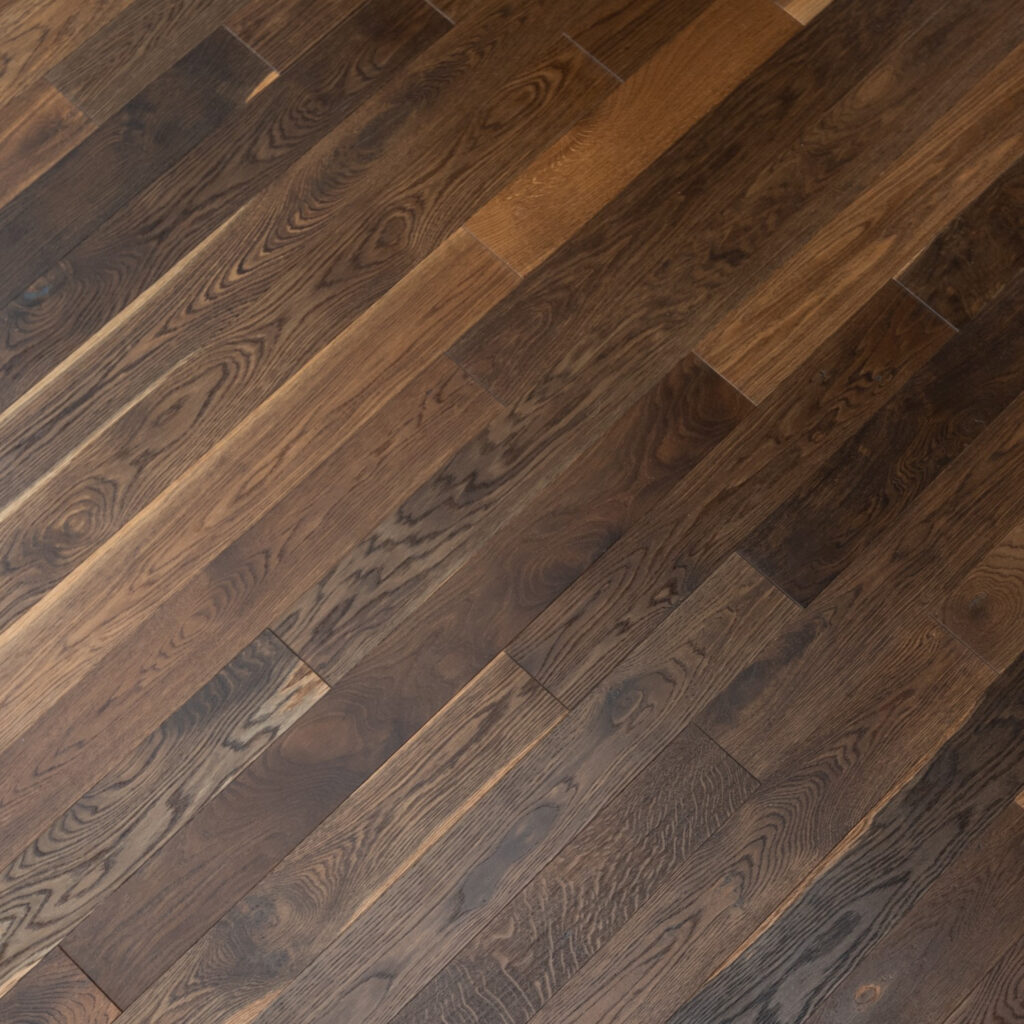Hardwood floors have become increasingly popular over the last several years, as homeowners seek to capitalize on all the important benefits they provide.
In fact, while hardwood floors have often been used in living rooms, bedrooms, and halls, they’re even becoming more commonly used in kitchens. In 2023, a HouzzKitchen Trend Report found that 22% of homeowners chose hardwoods instead of vinyl or other options when remodeling their kitchen.
But there’s another group of people who’re opting for hardwoods more often: high-rise condo owners. Given that hardwood floors will provide many of the same benefits to condo owners that they do homeowners, it’s easy to see why they’re becoming the go-to choice for many.
However, as with all living situations, it’s important to consider your flooring decision carefully to ensure you make the best choice. We’ll try to help below, by pointing out some of the benefits and drawbacks of installing hardwood floors in a high-rise condo.

The Benefits of Hardwood Floors in High-Rise Condos
Many of the benefits hardwood floors provide homeowners also apply to people who own condos. For example, the following are all things that apply to hardwood floors in virtually any type of residence (or commercial space):
- Aesthetic Appeal: While aesthetic appeal is certainly a subjective issue, most people love the way hardwood floors look. Some may prefer different types of wood and finishes, but just about everyone can find a hardwood floor that they love.
- Low Maintenance: Unlike carpet, which require frequent vacuuming (and the occasional deep cleaning), hardwood floors require very little maintenance. You’ll really only need to clean them with a push broom, perhaps once a month or so.
- Durability: Hardwood floors are typically much easier to keep looking good and in good condition than some other flooring options. They are typically stain-resistant (unlike carpets), and they will often outlast other floor types. When properly maintained, they can last for decades.
- Increased Property Value: Traditional homeowners have long loved hardwood floors for the significant return-on-investment (ROI) they provide. But they offer condo owners the same benefit and will usually help increase your property value, when you eventually decide to sell.
However, there are also a few things about hardwood floors that condo owners will find specifically helpful:
Temperature Regulation
Wood is a fantastic natural insulator, which means it can help prevent the rapid temperature swings that are common in some high-rise condos. This will not only help keep your unit more comfortable, but it will also help reduce your heating and cooling bills.
Indoor Air Quality
An underappreciated benefit of wood floors is the fact that they don’t trap pollen, dust, and dander the way carpets do. This provides significant health benefits for allergy sufferers or those with respiratory issues, and is especially helpful in high-rise condominium settings, where airflow is sometimes limited.
Increase the Apparent Size
Because condos are often significantly smaller than traditional homes, they can benefit from interior design choices that help make them feel bigger. Hardwood floors often do this very well, as they create a “flowing” look that helps to connect the condo’s various rooms (they do this exceptionally well in open-concept condos).
The Drawbacks of Hardwood Floors in High-Rise Condos
Even though hardwood floors can work quite well in condominiums, they do present a few challenges that you should consider before finalizing your flooring choice.
Noise Concerns
Unfortunately, because they’re not as soft as carpets, hardwood floors can cause noise issues. Sounds will tend to echo in your condo more once you’ve installed hardwoods, and your footsteps will likely be louder for your downstairs neighbors (particularly when you’re wearing shoes). Specialty flooring underlayment such as Floor Muffler or T56 has to be used to combat this.
Doesn’t Match All Aesthetic Designs
One of the benefits of hardwood floors is that they’re available in an array of styles, which means they’ll work in almost any house. However, they may not be a perfect fit for some condominiums, especially those with industrial or ultra-minimalistic aesthetics.
Installation Challenges
Installing anything dozens of floors above ground level creates additional challenges, and this includes hardwood floors. You’ll have to not only get the actual floor planks all the way up to your condo, but also any tools, underlayment, or other materials needed for the job.
Dry Conditions
Condo buildings are notoriously dry in winter seasons due to higher heating needs. It is necessary to maintain 35-55 relative humidity indoors to ensure your wood flooring is performing well. You can combat this by using a humidifier during the heating seasons.
Refinishing Concerns
While hardwood floors are quite durable and don’t require the kind of daily or weekly maintenance that carpets do, they do need to be refinished periodically (roughly once every 7 to 12 years). This process requires some significant tools, such as a floor sander, which may be challenging to get up to your unit.
***
It’s clear that there are a few minor drawbacks to installing new hardwood floors in a condo, but we remain convinced that the benefits clearly outweigh these shortcomings. In fact, we predict that hardwood floors will be used even more commonly in these situations in the coming years.
If you’re interested in installing hardwood floors in your condominium, schedule a consultation with one of our flooring professionals. He or she will be happy to help you think through the variables and provide expert advice for making the right choice. Or, you can simply stop by one of our showrooms to not only learn more but also see the available floors in person.

